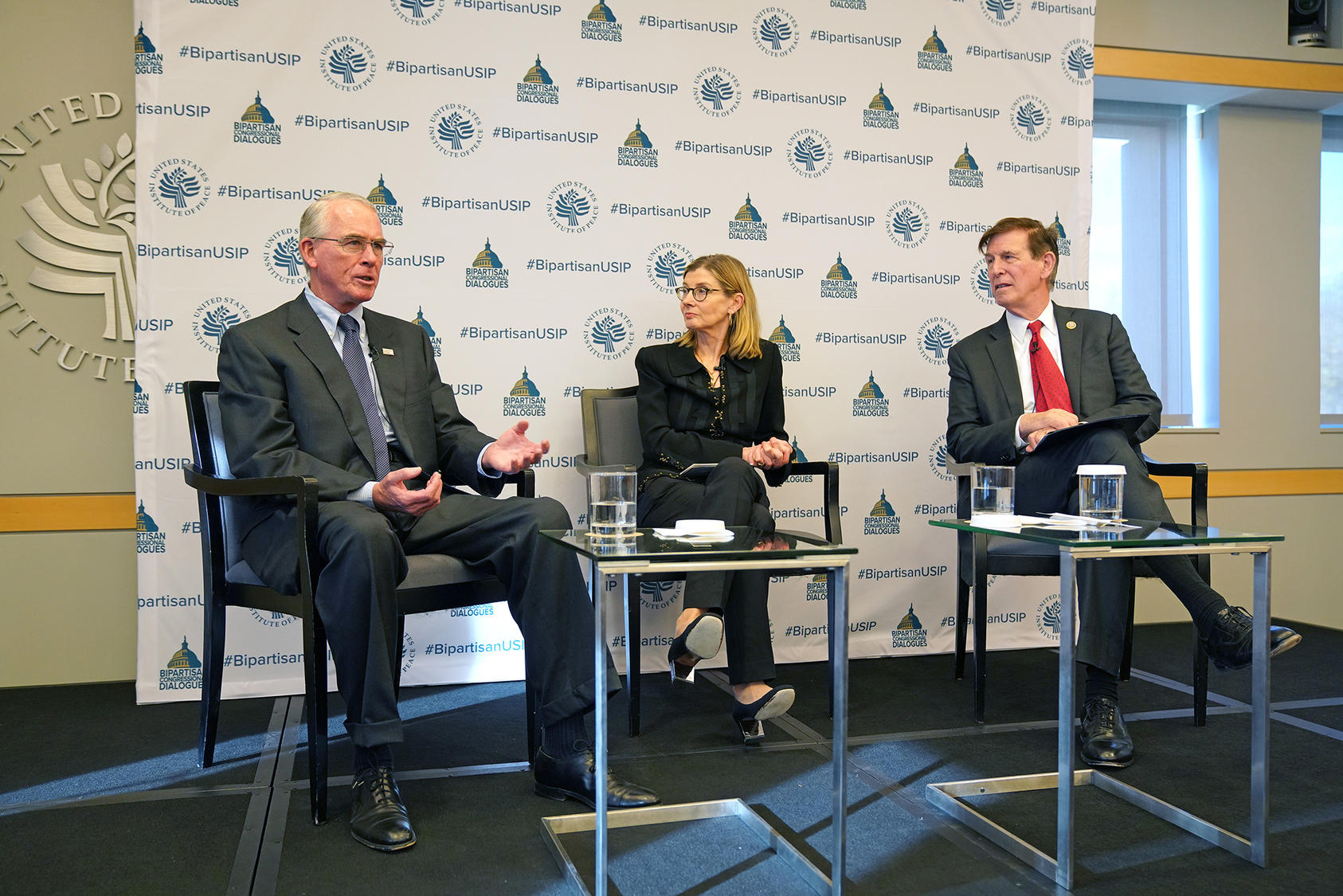Can Soft Power Work in a Sharp Power World?
Congressmen Rooney and Beyer discuss bipartisan efforts to counter coercion and disinformation warfare
Soft power, the appeal of a country’s culture and values to enhance its strength and influence, has a new foe in “sharp power.” As employed by global adversaries like Russia and China, sharp power utilizes information warfare techniques through media initiatives, cyber activities, and cultural exchanges to achieve geopolitical goals and weaken Western influence. Russia’s efforts to subvert the liberal world order and undermine global norms by interfering in democratic processes at home and abroad provides a salient example of sharp power at work.

How can the U.S. respond to this emerging threat? Speaking at USIP’s seventh Bipartisan Congressional Dialogue, Rep. Francis Rooney (R-FL) and Rep. Don Beyer (D-VA) discussed the threat posed by sharp power to global stability and how the United States, through bipartisan efforts, could use soft power to counter this threat. Rep. Rooney is the vice chair of the House Foreign Affairs Committee and former U.S. ambassador to the Holy See. A former U.S. ambassador to Switzerland and Liechtenstein, Rep. Beyer is the vice ranking member of the Science, Space and Technology Committee.
The congressmen underscored the importance of U.S. diplomatic and aid missions around the world, the need to unite in Washington around these critical tools of U.S. soft power and reflected on their experiences as U.S. ambassadors, which allowed them to see firsthand the effectiveness of soft power.
The Institute launched the dialogue series at the beginning of 2018 “to provide a platform for members of Congress who are working across the aisle on issues that are critical to our national security and to advance common interests,” said USIP President Nancy Lindborg, who moderated the discussion. “As an organization, we believe very strongly in fostering bipartisan efforts to strengthen national security.”
Sharp Power: The New Threat
As today’s media systems are increasingly open and interconnected, they are also vulnerable to sharp power tactics. Looking back to the post-World War II and Cold War environment and the rise of the Soviet Union through sharp and soft power, Rooney pointed to the subsequent founding of international institutions to try to counter these Soviet efforts and create symmetrical and reciprocal relationships among Western powers. He highlighted the development of U.S. soft power tools such as Radio Free Europe and Voice of America, USAID, and exchange programs that created “that symmetrical bond” across nations.
Examining today’s chaotic, multipolar world, Rooney pointed to a number of examples of how sharp power has been employed, such as Russia’s “disinformation campaign” in Europe and the U.S., and China’s “coercion and subornation” in Southeast Asia with the Belt and Road Initiative and in Africa and Latin America with its massive infrastructure projects.
For his part, Beyer stressed the growing vulnerability of democracies to sharp power tactics made possible by technological advancements and the rise of social media. He noted the unprecedented prevalence of subversion, intimidation, and internal meddling by autocratic governments. “Technology gives these governments the ability to cost effectively reach into cell phones, reach into living rooms around the world and sow fear, doubt, division, undermine alliances, [and] spread fake news,” Beyer said.
He pointed to the pervasiveness of sharp power beyond the traditional culprits, and “the centrality of the information warrior” to the security and diplomatic toolkits of autocracies. “In fact, no self-respecting dictator is without a paid legion of keyboard warriors on Twitter, or Weibo, or VKontakte, along with the pseudo-journalists, the hackers and the other agents of sharp power,” Beyer said.
Soft Power: A Shield and Weapon
Beyer said he worried that beyond the inherent dangers of the technological tools of global adversaries, America’s declining soft power around the world makes it even more vulnerable to sharp power. In order to reassert and maintain its power, both congressmen acknowledged that all forms of power are necessary components of statecraft, but maintained the importance of employing soft power tools. Three critical components to American soft power are: “Our cultural exports, our economic preeminence, and the power of the American ideal. We are the shining city on the hill,” Beyer said.
To counter sharp power with soft power, Rooney urged the U.S. to refocus on its values and culture, its symmetrical and reciprocal alignments that “allow everybody to win,” and build on multilateral trade relationships. He and Beyer both underscored the importance of USAID, cultural exchange programs, and the U.S. diplomatic corps. Rooney recalled his own experience with the Holy See and its mediation and diplomacy with the Islamic world, as well as its quiet soft power efforts in Cuba. “I think that soft power works really well when you don’t have to take credit for what you do; it keeps it soft,” he suggested. Rooney also lauded new soft power tools such as the U.S. Agency for Global Media and Farsi broadcasts into Iran, noting the positive and welcoming message they send to the Iranian people.
The congressmen urged policy changes and better education in the U.S. to help with the regulation and responsible consumption of social media. Asked by Lindborg if the U.S. needs to compromise its commitment to an open society—which has characterized who we are as a people—in the face of these sharp power attacks, Rooney and Beyer called for the U.S. to instead “double down” on this commitment and its values.
USIP's Bipartisan Congressional Dialogues will continue to bring together leaders from both political parties to address urgent national security and foreign policy challenges.



